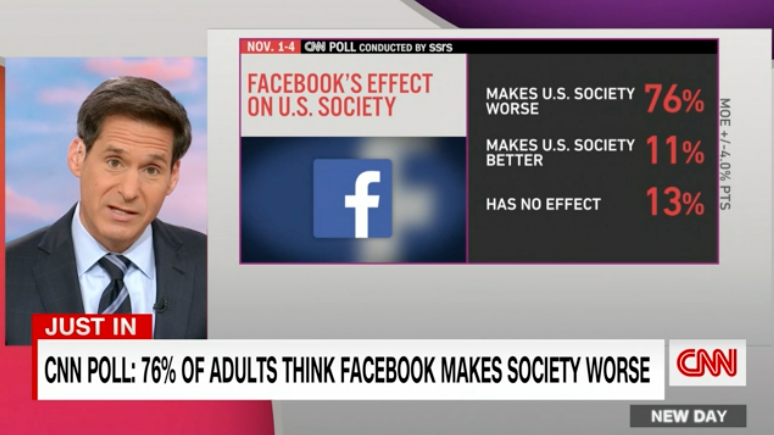This CNN consumer survey on Facebook will clear the way for regulation

CNN surveyed 1,000 Americans about Facebook. What they found will embolden regulators and legislators.
Here are the top-line results:
- 76% say Facebook makes society worse. This finding doesn’t vary much by gender, age, race, or among frequent Facebook users. Among Republicans, 82% feel this way.
- 53% support government regulation of Facebook.
- 49% say they know someone who was persuaded to believe a conspiracy theory because of Facebook content.
- 38% don’t trust big tech firms like Google, Facebook, or Amazon to do what is best for their users (up from 29% two years ago). Republicans are more suspicious of tech intentions than Democrats.
Regulate now
Why do people use Facebook if they believe it’s an untrustworthy force for evil?
You may as well ask why people drink alcohol or watch porn or gamble when they know it’s bad for society.
People can personally decide something is helpful, useful, or fun for them and feel that overall, it’s a problem if everyone does it. Americans have become complacent about such contradictions.
How does government deal with such problems? In the past we’ve tried prohibition, which didn’t work very well.
Americans are more likely to support punishing, taxing, and regulating companies responsible for creating such societal harm. This way they can keep using them, but feel the companies are paying the price for the harm they do.
This is especially likely when members of both parties are ready to regulate — and when the problem has been all over the news, as Facebook’s has with whistleblower revelations from Frances Haugen. When Elizabeth Warren and Josh Hawley agree on both the problem and the solution, regulation is likely.
What kind of regulation?
- Break up Meta, Facebook’s parent company, splitting off Instagram, WhatsApp, and Oculus.
- Require transparent documentation of social media algorithms and changes to them.
- Open data up to researchers again. (In August, Facebook cut off access to this data.)
- Implement a fairness doctrine requiring social networks to expose people to content from those with opposite views.
- Prosecute Facebook for misleading investors.
- Require increases in spending on content moderation, to catch more hate speech, harmful misinformation, and catfishing.
Ask yourself this: Would any users object to these moves? I doubt it. They’d satisfy the mass of consumers who say Facebook is responsible for societal harm.
Would these moves decrease the things that most people find useful in social networks? No. You could keep sharing pictures of your grandchildren, connecting with others in your model train enthusiast group, and sharing silly memes.
Voters and political parties are ready to regulate. It’s time to work out the details.
One Comment